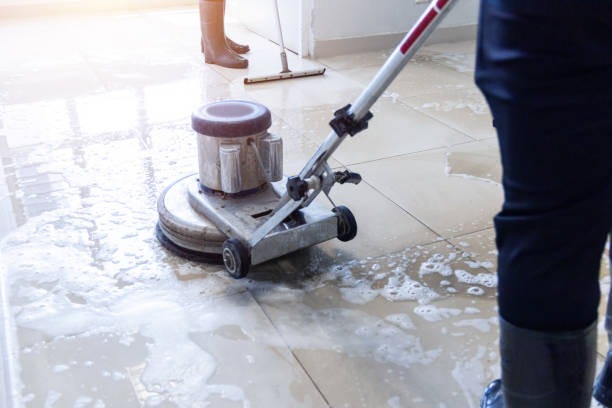Key Takeaways:
- Routine janitorial services are essential for creating and sustaining hygienic, safe, and comfortable office environments.
- Consistent cleaning supports employee health, productivity, workplace image, and compliance with health regulations.
- Comprehensive office hygiene looks beyond appearances and addresses unseen pathogens and allergens.
Table of Contents:
- Introduction
- Foundations of Office Hygiene
- Role of Routine Janitorial Services
- Health Benefits for Employees
- Improved Workplace Productivity
- Maintaining a Positive Workplace Image
- Regulatory and Compliance Considerations
- Conclusion
Introduction
Clean workplaces are integral to the optimal functioning of any office. A hygienic office environment creates a welcoming space for employees and clients and supports health, morale, and productivity. While surface-level tidiness is usually the first thing people notice, proper office hygiene involves a systematic cleanliness approach that addresses visible dirt and unseen pathogens. This is where routine janitorial services step in, bringing consistency and expertise to office hygiene that ad-hoc or irregular cleaning cannot provide—understanding why routine cleaning matters helps organizations remain proactive in safeguarding people and professional reputations.
Foundations of Office Hygiene
Office hygiene refers to the cleanliness and sanitation of shared workspaces, meeting rooms, break areas, bathrooms, and common touchpoints throughout a commercial space. A healthy office environment extends beyond simply removing dust and trash; it also involves eliminating harmful bacteria, viruses, and allergens that can impact the well-being of building occupants. Foundations of strong office hygiene include regular dusting, vacuuming, disinfecting high-touch surfaces, and adequate waste disposal. Each of these practices is essential for minimizing the presence of sickness-causing germs and maintaining a fresh and comfortable atmosphere indoors.
Another critical aspect is managing air quality. Good air quality is supported through regular carpet cleaning, cleaning of air vents, and prompt attention to spills or leaks that may cause mold. By implementing these foundational habits, an office can uphold cleanliness standards that benefit everyone who enters the space. A structured routine is key to consistency and effectiveness, reinforced through ongoing janitorial services.
Role of Routine Janitorial Services
The reliability of routine janitorial services elevates ordinary office cleaning into a comprehensive strategy for health and safety. Routine cleaning schedules provide a systematic approach for regular upkeep of all office areas, from entryways to restrooms and kitchens. Experienced professionals are trained to follow established protocols that ensure thorough cleaning with every visit, and their attention extends to often-neglected sites like under desks or along baseboards. This regularity prevents dirt, dust, and germs from accumulating over time and ensures that high-traffic areas are always ready to use.
Routine services often include disinfecting touchpoints, restocking hygiene supplies, trash removal, carpet and hard floor maintenance, and sanitary bathroom upkeep. Because janitorial professionals follow a detailed process, nothing is overlooked. Scheduled cleaning prevents lapses that can lead to unsanitary conditions or maintenance emergencies, and this peace of mind enables building occupants to focus on their work rather than worry about health risks or cleanliness concerns.
Health Benefits for Employees
Employee health is directly influenced by workplace hygiene. Germs and allergens build up on surfaces, devices, and furniture, especially where many individuals congregate or share equipment. Routine cleaning disrupts this accumulation, reducing the risk of cross-contamination and illness. Offices that maintain consistent hygiene see lower absenteeism rates because employees are less likely to become sick. Common infectious diseases, such as colds and flu, can spread rapidly in an unclean environment, impacting entire teams and workflow.
In addition to minimizing the spread of viruses and bacteria, routine cleaning significantly reduces the presence of dust, mold spores, and other irritants that may worsen allergies or trigger respiratory symptoms. Cleaner air and surfaces support those with asthma or sensitivities, leading to an environment where employees feel comfortable and productive. Ultimately, prioritizing hygiene through regular janitorial practices is an investment in every team member’s physical and mental well-being.
Improved Workplace Productivity
Productivity thrives when employees have a safe, clean environment in which to work. Cluttered or dirty offices can be distractions, reducing the focus and morale of even the most dedicated staff. Conversely, consistently cleaned and maintained workspaces help people concentrate better, reduce time lost searching for clean tools or supplies, and enhance overall job satisfaction. Routine janitorial services ensure that desks, meeting rooms, communal areas, and restrooms always meet high standards of tidiness, allowing everyone to do their best work.
Industry research supports the link between productivity and workplace cleanliness. It consistently shows that orderly environments support clearer thinking, minimize stress, and create a more welcoming atmosphere. Businesses that prioritize sanitary conditions through reliable janitorial routines demonstrate to their employees that their well-being is valued, which campaigns for loyalty and commitment. All these factors combine to boost performance and efficiency across any organization.
Maintaining a Positive Workplace Image
First impressions count in business, and an office’s cleanliness communicates professionalism, attention to detail, and corporate values. A spotless environment influences the perceptions of clients, visitors, and even potential hires after just one look. Routine cleaning eliminates sources of unpleasant odors, sticky surfaces, visible dirt, or overflowing waste bins—issues that can undermine a company’s reputation and credibility.
Maintaining a polished office speaks volumes about the standards a business upholds. Clean, fresh-smelling common areas, well-maintained restrooms, and uncluttered workspaces help create a positive atmosphere where staff and visitors feel welcome. Janitorial services ensure that these areas always present a high standard, supporting staff pride and client confidence in equal measure. For businesses operating in competitive sectors, standing out for the right reasons often starts with something as fundamental as cleanliness.
Regulatory and Compliance Considerations
Offices must meet legal health and safety standards as set by governmental and industry regulations. Routine janitorial services play a key role in maintaining this compliance. Regular cleaning and disinfection help offices align with hygiene, waste management guidelines, and the safe operation of communal facilities. Regulations can dictate the frequency of cleaning, approved chemicals, and safe handling measures, all overseen by professional janitorial teams.
Maintaining compliance helps avoid the risk of citations, penalties, or business interruptions and safeguards everyone on-site. Detailed recordkeeping and routine checklists can provide proof of adherence to standards, showcasing the organization’s dedication to a safe workplace. It is far easier to consistently meet these requirements with the help of professionals, rather than relying on sporadic or informal cleaning efforts.
Conclusion
Office hygiene is an asset that shapes any business’s present and future. Janitorial services are indispensable to achieving and maintaining hygienic office conditions, supporting health, productivity, and workplace reputation. Through consistency, expertise, and attention to every detail, routine cleaning routines protect what matters most: the well-being of employees, the satisfaction of clients, and the integrity of the organization. Investing in professional and regular cleaning is fundamental to running a safe, successful, and thriving office environment.



